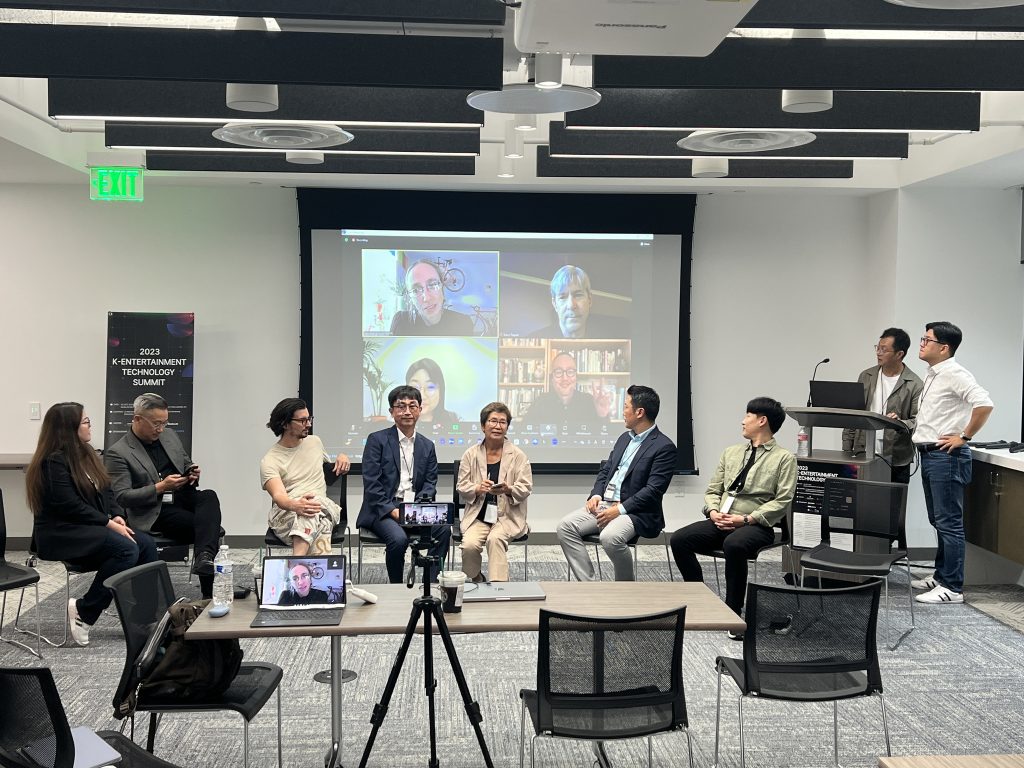
The 2023 K-Entertainment Technology Summit (K-EnTech Summit) was held in downtown Los Angeles on October 20.
The event was organized to discuss the present and future of Korean content (drama, movie, webtoon, K-pop), technology platforms (media, streaming, etc.), and entertainment-tech companies (AI, metaverse, etc.), which are in high demand in global markets.
Part 1 consisted of the current state of K-Entertainment and technology, Part 2 introduced K-content platform companies, and Part 3 consisted of discussions between attendees.
Attendees from Korea and the United States participated in the event both online and offline. Attendees discussed the current state of Korean content and ways to develop it under the theme of ‘Conditions for K-Entertainment and K-Culture Beyond the Hallyu’.
In particular, experts emphasized that Korean content has gone beyond Asia to become a “mainstream culture” in Western countries such as the United States. They said that Korean content, including K-pop, attracted attention in Asia 20 to 30 years ago, and then constantly struggled to enter the Western media, including the United States. As a result, they said, from the mid-2010s to the present, Korean content has become very popular and prevalent around the world.
CedarBough T. Saeji, a professor of international studies at Busan National University in South Korea, attributes the success of Korean content in the U.S. to “content creativity and distinctiveness, integration with IT, and integration with the characteristics of the new generation.” “Consumers are always looking for something ‘new,'” she said. “K-pop offers attractive singers, choreography, and colorful visuals that audiences want. In particular, K-pop is optimized for IT platforms such as YouTube and TikTok, which attracts the attention of the new generation.”
Saeji also said that the K-pop industry has maintained its popularity by pursuing rapid transformations through adaptation, such as allowing idol groups to pursue solo careers, collaborating with webtoons, and strengthening international communication in English.
However, she said, “The Korean government shouldn’t take the lead, but only support the private sector.” She especially pointed out that K-pop idols should never be used as a means to promote certain political agenda or to boast of government’s achievements. “We must also maintain the uniqueness of the Korean language and culture on its own,” she concluded.
Pil Ho Kim, a professor of East Asian Languages and Literatures at Ohio State University, said, “K-pop and other Korean content are being enjoyed all over the world, including the United States, in the wake of BTS. Korean content contains elements that are popular in Korea, Japan, and the United States. It also reflects our efforts to introduce Korean content to the U.S. over the past 20 years.”
IT platforms such as Netflix, Disney+, and YouTube are also contributing significantly to the spread of Korean content. However, the gap between the well-funded global platforms and the relatively small Korean industry is a challenge. Kim said it is crucial to narrow the gap between Global Enter-Tech giants and local level media distributors when it comes to providing services to the audiences.
Darcy Paquet, a professor at the Busan Asian Film School, commented, “Korean production companies excel in content creation and have invested in and developed the industry more extensively than any other nation.” He also added, “While Korean content is achieving success in the U.S., related industries such as theaters are facing a crisis. Korean productions must shift their economic perspectives and embrace new endeavors and challenges, rather than simply expanding their content’s reach.”
The event was co-hosted by Direct Media App, Hamilton Lugar School of Global and International Studies Institute for Korean Studies, and Pukyong National University.
BY HYOUNGJAE KIM, JUNHAN PARK [kim.ian@koreadaily.com]




